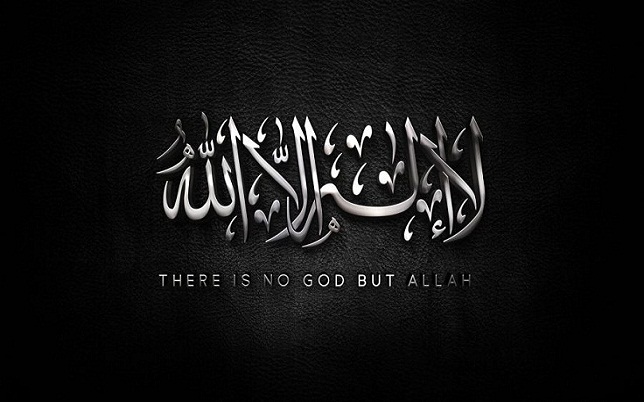Faith in the existence of God and a constant awareness of Him and a ready expression of this awareness is a fundamental and inalienable constituent of the life and culture of Muslims.
Islamic Civilization can aptly be compared to a dress which is worn in different styles at different places according to the taste, climatic and other conditions prevailing there but its texture is the same everywhere and it is dyed in the same hue so deep that every tissue and fiber of it is totally impregnated with it. The name of God and His remembrance run like blood in the veins and arteries of Islamic Civilization.
Here we are presenting various examples in the life of a Muslim which adequately shows the importance of Allah in Islam and in the life of Muslims.
Contents
Importance of Allah at the Birth of a Muslim
- When a child is born in a Muslim home, the first ceremony it undergoes, within a few minutes of its birth, is that the Azaan 1 is spoken in its ears. Thus the first name it becomes familiar with, even before he acquires his own name, is that of God.
- On the seventh day, the Aqiqa 2 is performed, as approved by the Prophet, when an Islamic name is given to it, the choice generally falling on one which expresses the sentiment of loyalty to God or proclaims His absolute Unity and Oneness or is patterned after the names of that most exalted group of Monotheists-the Prophets-or their pupils or immediate disciples.
Importance of Allah in Education of A Muslim
- When the time comes for the child to begin his education and go to school, it is celebrated with the recitation of the name of God and a few verses from the holy Quran 3. This ceremony is known among Indian Muslims as Tasmiya Khwani or Bismillah.
Importance of Allah in Marriage of a Muslim
- At marriage again, the name of God is invoked to unite together in a permanent bond two mature and responsible persons who also have to take the pledge to uphold the prestige of that name throughout their lives.
- The wedding sermon is delivered in the manner sanctified by the Prophet’s practice, expressing gratitude to God for having created the human race in pairs of men and women and exhorting the couple to live and die in a state of faithfulness to Him.
Importance of Allah During Festivals
- When the auspicious day of Eid-ul-Fitr 4 arrives, a Muslim is called upon to raise his voice in the affirmation of His Glory and Greatness (Allah-o-Akbar) and offer two rakats of prayers in thanksgiving, after he has bathed himself and put on a dean dress.
- At Eid-ul-Azha 5 he is desired to offer up animal sacrifice in God’s name.
Importance of Allah at the Death of a Muslim
- Finally, when the ultimate stage of life’s journey is reached, a Muslim is instructed to focus all his attention on that very name. Every Muslim, man or woman, has the ambition of dying with the sacred name of God on his or her lips.
- When the news or his death circulates, all educated (and even uneducated) Muslims who hear it spontaneously repeat the Quranic words, Inna Lillah-e-wa Inna Ilaih-e-Rajeoon (meaning to God we belong, and to Him do we return).
- The funeral prayers, which are the last act of service to him, reverberate with the name of God from beginning to the end. These prayers are a solemn request to the Almighty by the participants for the salvation of the soul of the departed and for themselves that they may be granted a life of loyalty and devotion to Him in this world and of peace and felicity in the next.
- As the body is lowered in the grave it is to the accompaniment of these words: “In the name of God, and according to the way of His Apostle’s religion and the Millet.’’
- In the grave, the face is turned towards that universal center of Divine worship anti Monotheism which goes by the name of Ka’aba (House of God). Wherever a Muslim may be buried his face will without exception, be in line with that one place at Mecca in Arabia.
- After the burial, no Muslim passer-by will, usually fail to offer the Fateha 6 at his grave and pray for the remission of his sins and the deliverance of his soul.
Importance of Allah in Daily Life of a Muslim
The name of Allah and His remembrance are a constant companion of a Muslim’s life from the cradle to the grave. Above we have presented the more important landmarks of man’s life. In his everyday routine also, a Muslim is never short of Allah’s remembrance.
- The summons to daily prayers (Salah/Namaz), generally proclaimed from the towers of a mosque 5 times a day.
- When a Muslim sits down to eat, he begins his meal with the name of God and ends it also in the same manner.
- Those who are particular about the observance of the Sunnah of the Prophet carry out the minutest details of life with the name of the Lord on their lips and His thought embedded in their hearts.
- Take such a trifling thing as a sneeze. A Muslim is required to remember God when he lets it out, and those who hear it also are instructed to send up a prayer for him.
- What is more, the daily conversation of a Muslim is interspersed with phrases like Masha-Allah (As God willed), Insha-Allah (If God wills) and La Haula-Wa La Quwwata Illa Billah (There is no power or virtue but in God).
- These phrases, apart from being ideal prayer-formulas, have gained currency as terms of everyday speech not only in Arabic, but in the languages of those countries too where Muslims have been living for some time and which have received the impress of Islamic Civilization. In truth, these phrases are in the nature of convenient aids to Allah’s remembrance.
The culture, language and the daily life of no other people except Muslims will be found to be so thoroughly soaked in faith in God’s existence and an all-embracing consciousness of Him.

